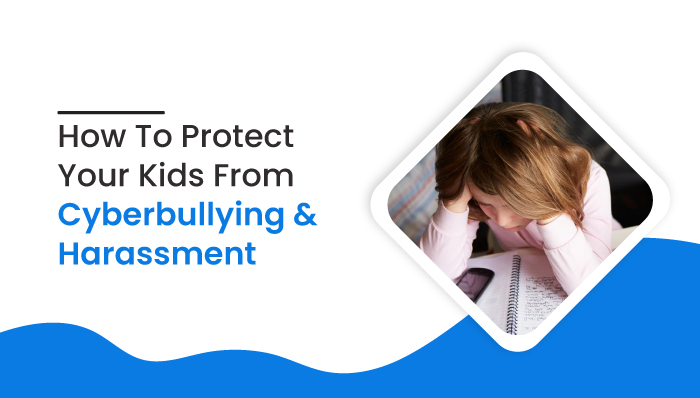How To Protect Your Kids From Cyberbullying And Harassment?

How To Protect Your Kids From Cyberbullying And Harassment?
How to protect your kids from cyberbullying and harassment is a major concern for every parent nowadays? One of the most difficult problems for parents today is determining how to manage their children’s access to technology. We worry about them spending too long staring at screens and not getting outside to play when they are young.
They begin to ask for their cell phone as they get older, and the world (the good, the bad, and the ugly) becomes available in the palm of their hand. Unfortunately, the rise in popularity of the internet, smartphones, and text messaging has resulted in a major cyberbullying problem.
Cyberbullying is now a much bigger problem than it was even a decade ago, thanks to the rise of network devices and the ever-expanding Internet of Things. Children and teenagers are spending more time online: 92% of children now use the internet daily, with nearly a quarter logging in “constantly.”
These figures can sometimes add up to some disastrous real-world consequences. Not only do these “hyper-networking” teenagers share more private information on their social media profiles than their peers, but they are also 110% more likely to be cyberbullied.
Over one million children and adolescents were bullied on Facebook alone last year, and 87 percent reported witnessing or experiencing risky behavior online. Cyberbullying is now linked to various mental health issues, including depression, drug abuse, and suicide.
What does cyberbullying and harassment mean?

Bullying that evolves through the use of digital media is, in general, cyberbullying. It can happen in various places, including social media, messaging platforms, mobile phones, and gaming platforms. It’s a pattern of behavior meant to terrify, anger, or shame the people who are being targeted.
Harassment is inappropriate behavior that offends you or makes you feel threatened or humiliated. It can happen on its own or in tandem with other forms of discrimination. Unwanted behavior can take the form of spoken or written words, as well as abuse. Emails, tweets, and comments on social media sites are offensive.
How Cyberbullying and Harassment Cause Anxiety and Stress?
Cyberbullying and harassment, like any traumatic event, can cause victims to experience immediate and long-term stress and anxiety. They frequently feel lonely, isolated, vulnerable, depressed, and anxious due to their experiences.
It’s critical to recognize danger signs that your child is being cyberbullied, such as the wones listed on stopbullying.gov:
- Noticeable increase or decrease in the use of devices, including texting.
- They have strong emotional reactions to what is happening on their device, such as anger.
- They keep their device hidden from you and refuse to tell you what they’re doing with it.
- Accounts on social media are replaced or deactivated.
- They stay away from social situations.
- They withdraw or become depressed, and they lose interest in friends, family, and hobbies.
- Sleeping problems.
- Headaches, nervousness, and stomachaches are examples of physical complaints.
- Children don’t want to go to school.
Ways to protect your kids from cyberbullying and harassment
Navigating the ever-changing world of technology can be challenging, but it is now an integral part of parenthood. We must teach our children how to cross the street and not talk to strangers. There are various ways to monitor your children’s online activity and help prevent or manage to cyberbully if it occurs.
Use parental controls
Parental controls are software and tools used to block inappropriate websites, set screen time limits, and keep strangers from contacting your children online. You can monitor your child’s activities and control what they can view by using a parental control app on their device. You’ll be able to see their messages, contacts, browsing history, and emails as well.
There are many parental control programs to choose from, including some that are free, to begin with. Each, of course, has its own set of tools and levels of control to consider.
You don’t have to keep track of your child’s online activities in secret. If you have a conversation with your kids about proper smart etiquette and cyberbullying, they’ll feel more comfortable coming to you if in case they’re the victim.
Also, keep in mind that parental controls do not always reduce the risk of cyberbullying, but they can be a valuable data collection tool if an issue occurs, either to or by your child.
You can monitor all activity, and you can take immediate action to protect your kids from cyberbullying and harassment in case of any threats.
Educate your kids
Our children require our assistance. According to a recent survey, 24% of kids and teens say they don’t know what they’d do if they were harassed digitally, and 39% don’t enable their social media privacy settings.

Teach your children about the threats of the internet, including cyberbullying. Explain to them that the “friends” they make on the internet might not always be who they claim to be. They need to be cautious about the information they share with others. Teach them how to set up security features in various programs and how to block accounts.
Overall, we need to guide them to make responsible technology decisions on their own and speak up when something is bothering them.
Set boundaries
We must team up with our children to determine the best way to manage screen time. Establish limits and boundaries for acceptable digital behavior, content, and apps. If you notice something that seems to be inappropriate, tell them right away.
If you read about a dangerous game, explain why you don’t want your child to play it. Assure them that you are not attempting to invade their personal space. Assure them that you care about them, that you are on their side, and that you only want to keep them safe.
Encourage them to speak out against bullies
Encourage your children to stand up to bullies. Bullies are more likely deterred by peer pressure than by anything else. Teach your kids that reporting a cyberbullying incident is not the same as leaking information.
The majority of social media platforms and schools have clear policies and reporting procedures in place. If a classmate is cyberbullying your child, assist them in reporting the incident to the school. If a child receives physical threats or a possible crime or illegal behavior occurs, contact the police.
Allowing our children to speak up against bullying and harassment will empower them to speak out against it. We give our children the tools to recognize when something doesn’t feel right by raising confidence, emotionally intelligent, and kind children. Also, never forget to love and support them during these trying times.
Conclusion
Cyberbullying is the most common online threat. As a parent, discussing the issue openly is the best way to equip your child with the tools she needs to protect herself from virtual sticks and stones. Know the ways to protect your kids from cyberbullying and harassment, and keep them safe.



 WhatsApp Spy
WhatsApp Spy Facebook & Messenger Spy
Facebook & Messenger Spy Viber Spy
Viber Spy Instagram Spy
Instagram Spy Skype Spy
Skype Spy TikTok Spy
TikTok Spy Telegram Spy
Telegram Spy LinkedIn Spy
LinkedIn Spy Twitter Spy
Twitter Spy Youtube Spy
Youtube Spy Photo Spy
Photo Spy Video Spy
Video Spy Calls and Contacts Tracking
Calls and Contacts Tracking SMS & IM Chats
SMS & IM Chats Voice Capture
Voice Capture Image Capture
Image Capture Video Record
Video Record